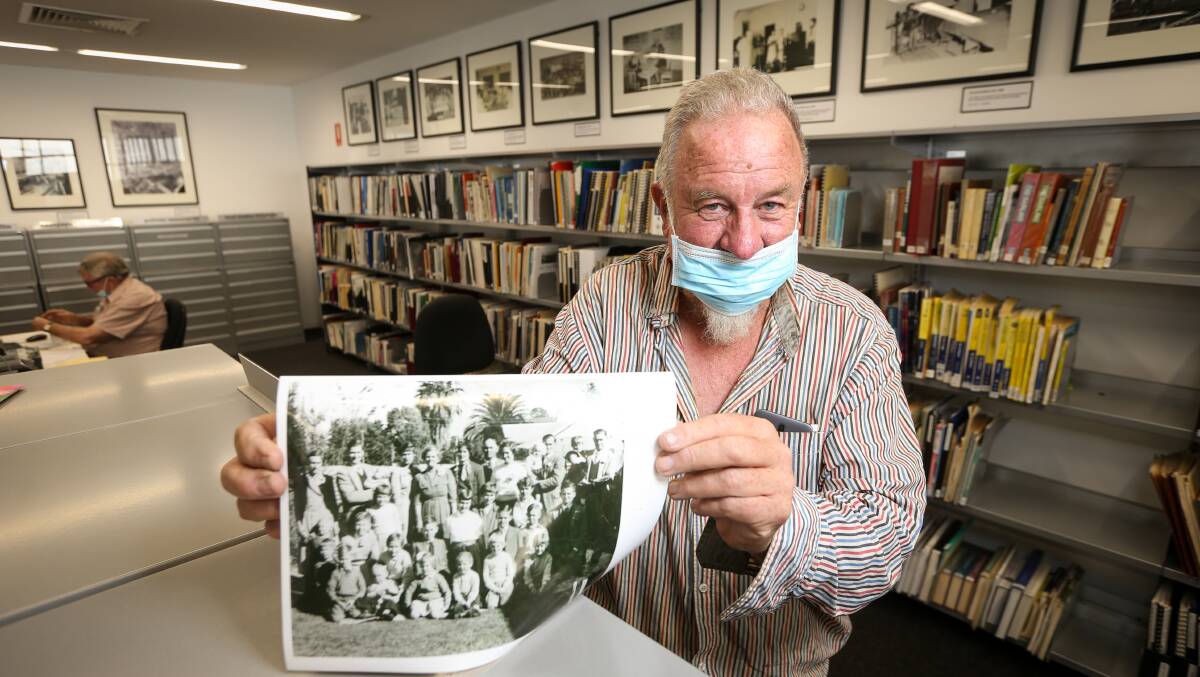
A nice, quiet young woman, who was very talented at sport, Judith Larkins, left Holbrook for Canberra in autumn 1963.
Subscribe now for unlimited access.
$0/
(min cost $0)
or signup to continue reading
The 21 year-old exited her hometown to work as a telephonist in the national capital.
Not surprisingly after being part of a Holbrook Blues team which won 13 consecutive Albury and district hockey grand finals, she continued to wield a stick in Canberra.
Having joined the Ex-Students team, Miss Larkins took to a pitch at Southwell Park in the northern suburb of Lyneham on the afternoon of September 28, 1963 for a semi-final against Barton.
Her team captain Margaret Hanson recalled it became an extraordinary occasion.
"It was during the second half, and Judith had just scored a goal and we were back on the centre-way line about to restart the game," Mrs Hanson said.
"I'd just said to Judith 'great goal', tapped her on the shoulder, took one step back, then a giant white sheet descended from the sky and that was it.
"The next [thing] I remember lying on the ground and Judith's feet were in my face."
Mrs Hanson was among 20 of the 22 players knocked to the ground by the force and after opening her eyes the horror of what her teammate suffered was shockingly clear.
There was a burning smell and I soon realised it was Judith's rubber shoes, they were burnt onto her feet," she said, adding "her reddish hair was sticking up like she'd been electrocuted".
Mrs Hanson's hockey stick was at least 20 metres away, "blown away by the force of the lightning strike".
Her husband Murray was watching from a car with a friend, Ralph Westen, whose wife Billie was playing in the game.
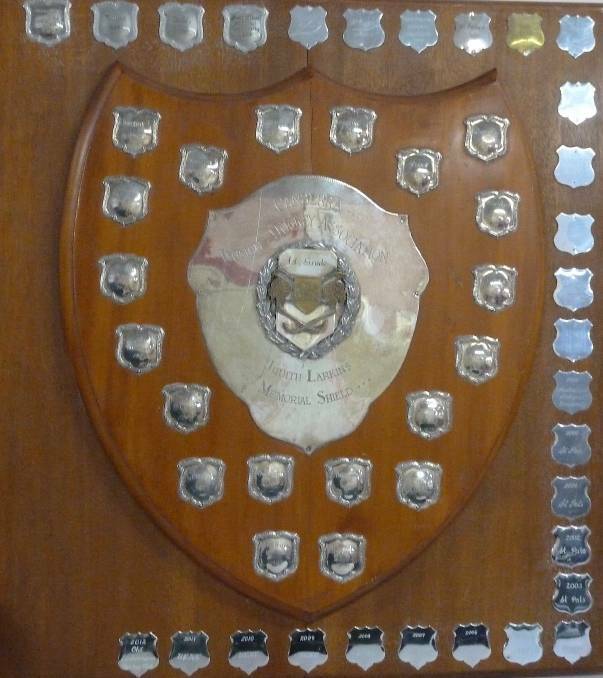
"With great presence of mind, Ralph, who'd served in the Dutch Army, said I'll go and call for an ambulance, you go and help on the field," Mr Hanson said.
Being well before the days of mobile phones, Mr Westen ran from house to house trying to raise the alarm and after knocking on about three doors finally got an answer and called an ambulance.
Meanwhile, on the field it was chaos with eight players on the ground for some time, with several receiving CPR by stunned bystanders and a group of off-duty policemen who raced to the scene from a nearby hotel.
Meg Hartmann was left inner for Barton.
"I was only about 1.5 metres away from Judith when the lightning hit," she said.
"It was like someone came up and wrapped a black piece of material around me, and I was out to it."
Mrs Hartmann's next memory is having her vital signs checked at hospital.
A fleet of ambulances ferried all the players to hospital where they were assessed.
Despite valiant efforts to save Miss Larkins, she remained unconscious and died about 12 hours later of heart failure.
The doctor at the coronial inquest a few months later reported "there was evidence of burns on the right side of her neck, extending down the front of her body".
There were no long-term injuries to the other players.
"One of our wingers lost her voice for a few weeks and another player was temporarily paralysed for a few days down [one side] for several days," Mrs Hanson said.
Mrs Hartmann said her uniform - her boots, socks and shirt - all had scorch marks from the lightning strike.
News of the tragedy soon filtered back to Holbrook, with a pall hanging over the town by that Saturday night.
The calamity was reported across two columns down page in Monday's Border Morning Mail under the headline 'Fireball kills Holbrook girl'.
It stated a "sudden streak of light flashed across the ground at 4.10pm" and five people on the field, including Miss Larkins, were admitted to hospital with severe burns.
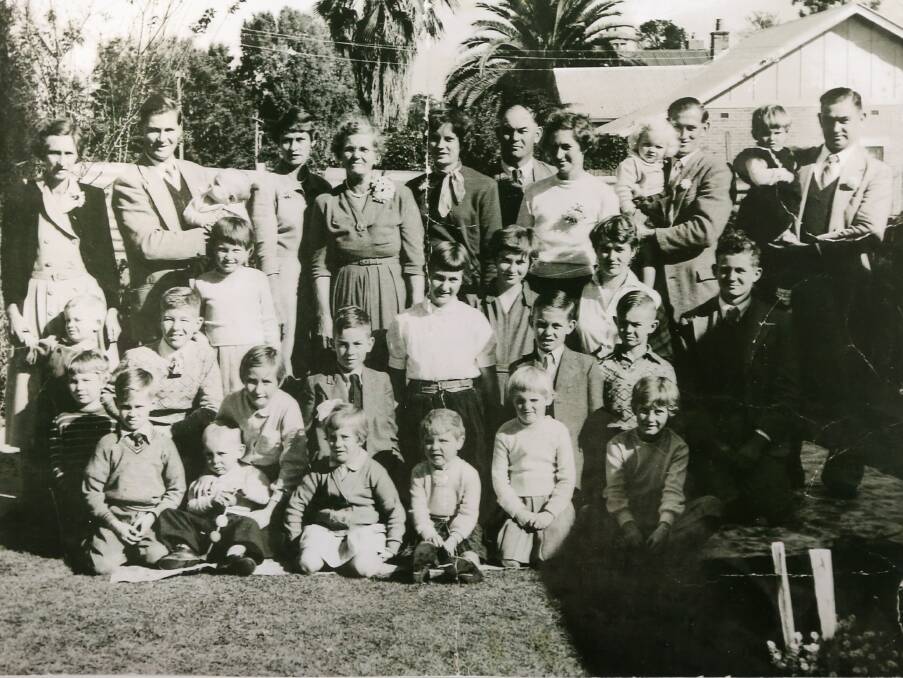
Among those in disbelief back in Holbrook was Judith Smith (nee Wornes), who had gone to the local Catholic primary school with Miss Larkins and joined her in those successful Blues hockey teams.
"I was like everyone, I was so shocked and amazed," Mrs Smith said.
"I thought it can't be happening, to be playing a game of hockey and to have something like that happen.
"Everybody was in shock because she had her mum and dad here and they lived here for years after poor Judy passed away."
IN OTHER NEWS:
Miss Larkins' half-brother John Lynch, who is six years younger than his late sibling, still lives at Holbrook.
His mother Dorothy married his father Alec Lynch in Wagga in 1947, after her previous husband Keith Larkins died in 1942, when Judith was only six months old.
Having suffered two huge losses, Mr Lynch said his mother, who died in 1997 two years short of 90, kept her pain inside.
"She was very upset, she was extremely upset but she never talked about it much," Mr Lynch said.
As a 15 year-old at the time of the loss, Mr Lynch recalled the funeral at the Our Lady of Sorrows Church at Holbrook on the Tuesday after the hockey match was huge.
Miss Larkins was interred at the cemetery at Holbrook.
Her headstone reads: "In loving memory of Judith Anne Larkins loved daughter of Keith (dec) and Dorothy. Died 29th Sept 1963. Aged 21 years. R.I.P."
Mrs Smith said Miss Larkins grew with a well-known stepfather because Mr Lynch ran Mackie's supermarket and general store in the main street of Holbrook.
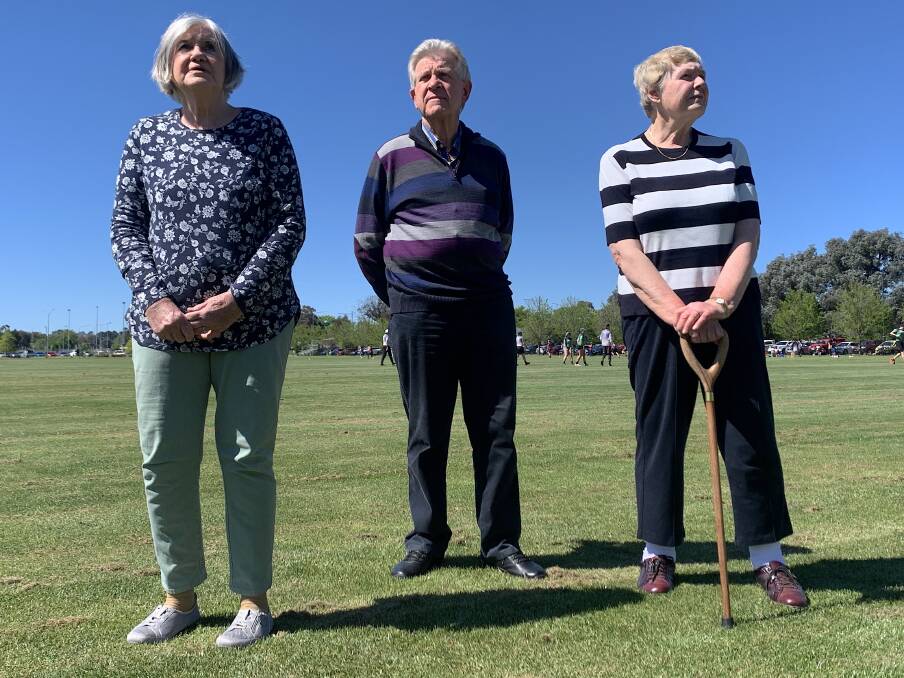
Its building near Ten Mile Creek stills stand and is now home to the National Museum of Australian Pottery.
Miss Larkins had worked not too far away at the Holbrook Shire offices before her shift to Canberra.
Mrs Smith said her friend was a calm presence.
"She was a very nice girl, she was very quiet," Mrs Smith said.
"She was an excellent sportswoman, nothing worried her, she didn't get cranky and her personality was pleasant all the time."
One of the few tangible reminders of the fateful day in Canberra is the Judith Larkins Shield which is awarded each year to the ACT first grade women hockey premiers.
Although it seems the current crop of hockey players are not all aware of the significance of the trophy.
"A few years ago, my hairdresser, a player at the time, reported winners were drinking out of the trophy - they didn't realise its history, I was a bit disgusted," said Mrs Hanson, who at one stage captained the ACT team.
"No one from the local hockey association has invited any of us back to talk about it or to present the trophy which is a little strange.
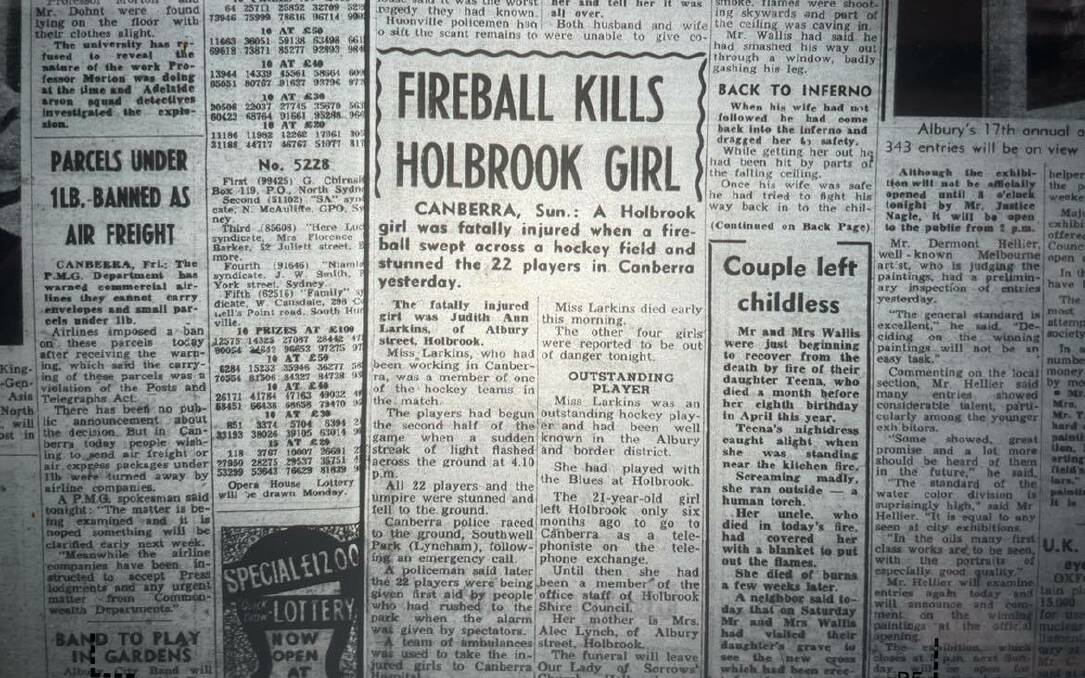
"It's as if the whole event was swept under the carpet."
Apart from Miss Larkins' death at Southwell Park, there is only one other recorded case of a hockey player being killed by lightning in Australia.
According to Risk Frontiers, a research body into that assesses hazards, 32 year-old hockey player Brian Roberts died in Hamilton in western Victoria, on April 23, 1983.
All but one of the players on the field were felled by the lightning and other than Mr Roberts, five of them were hospitalised.
It is estimated there are five to ten fatalities each year in Australia as a result of lightning strikes.
Our journalists work hard to provide local, up-to-date news to the community. This is how you can continue to access our trusted content:
- Bookmark https://www.bordermail.com.au/
- Make sure you are signed up for our breaking and regular headlines newsletters
- Follow us on Twitter: @bordermail
- Follow us on Instagram @bordermail
- Follow us on Google News.d

